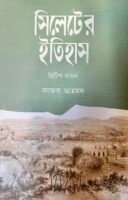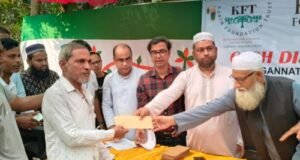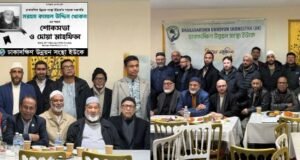
Ansar Ahmed Ullah:
The book in Bengali, (Sileter Itihaf), is written by the well-known community historian Faruque Ahmed.
The book explores key themes such as Sylhet’s cultural, political, and social connections with the rest of Bengal and Assam during British rule, the Bengali language movement in the Assam Assembly in 1927, the 1947 referendum that led Sylhet to join East Bengal, post-partition identity, and debates over Bengali as a state language, as well as the unique land systems and political structures that are distinct from both Assam and East Bengal. This comprehensive and well-researched book is ideal for historians, researchers, and anyone interested in the evolution of Sylhet under colonial and post-colonial influences. It represents a substantial scholarly work tracing Sylhet’s historical intersection with Bengal and Assam, notable for its depth and documentation.
Written in clear Bengali, the book is not just for scholars and researchers, but also for the broader Bengali-speaking audience. It is designed to be accessible and engaging, making it a valuable resource for anyone interested in Sylhet’s history and culture.
Sileter Itihaf is a meticulously researched historical monograph that explores the social, political, and cultural history of Sylhet, primarily during the British colonial era, and its transition into East Bengal (now Bangladesh) post-1947. The book not only traces historical events but also examines the interplay between Sylhet’s unique geographical positioning and its evolving cultural ethos. It scrutinises how Sylhet’s historical trajectory was shaped by its status as a borderland region, frequently caught between the influences of Bengal and Assam. This perspective adds a layered complexity to the narrative, highlighting Sylhet’s distinct identity and its role in shaping broader historical dynamics. The author’s dedication to uncovering untold stories ensures that the book resonates deeply with those seeking to understand Sylhet’s multifaceted past.
Faruque Ahmed’s research is based on a rich collection of colonial documents, government records, assembly proceedings, and local press accounts. His focus on primary sources enhances the academic credibility of the work, providing readers with a comprehensive and reliable account of Sylhet’s history.
The book is notable for its analysis of language, regionalism, and identity formation. The discussion of the Bengali Language Movement in Assam (1920s–40s) and the 1947 Sylhet Referendum is particularly insightful, demonstrating how linguistic and cultural identity influenced Sylhet’s political trajectory. He effectively places Sylhet within the broader context of Bengal’s history, challenging the narrative that Sylhet was marginal to nationalist and regional movements. His work reclaims Sylhet’s agency and underscores its contributions to broader subcontinental dynamics.
Sileter Itihaf is a seminal contribution to Bangladeshi and Assamese historiography. It addresses a longstanding gap by providing a regionally grounded, thoroughly sourced history of Sylhet that scholars, policy analysts, and cultural historians can utilise. Additionally, it serves as a valuable corrective to oversimplified nationalist histories.
This book is highly recommended for scholars of South Asian history, particularly those interested in border regions and identity politics, as well as students and researchers of language movements, colonial policy, and referendums in British India. It is a valuable resource that offers a profound understanding of Sylhet’s history and its significant role in shaping regional consciousness in Bangladesh and Northeast India.
Faruque Ahmed is recognised as a dedicated historian, particularly focused on Sylhet’s role within the broader context of Bengali history. Born in 1964 in Goashpur, Golapganj, Sylhet, he is a historian, lyricist, playwright, and editor who has been based in London since 1989. In 2013, he was awarded the Bangla Academy NRB Writers’ Award. He has authored works in both Bengali and English on topics related to the Bengali diaspora, journalism, and politics. His current book, published by the renowned University Press Limited of Dhaka, contains 607 pages. The book is available on The University Press Ltd. website, priced at Taka 920.
 Weekly Bangla Mirror | Bangla Mirror, Bangladeshi news in UK, bangla mirror news
Weekly Bangla Mirror | Bangla Mirror, Bangladeshi news in UK, bangla mirror news







